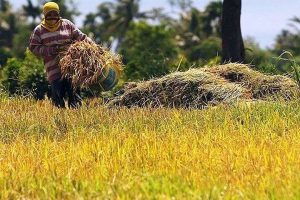Marcos hopes to avoid rice imports with ‘luck’
PRESIDENT Ferdinand R. Marcos, Jr. said he does not consider the supply-demand situation for rice to constitute a “crisis,” though he acknowledged that the supply of rice could tighten in the near term. “We are watching and waiting to see what the production levels are going to be after the last planting season,” he said […]

PRESIDENT Ferdinand R. Marcos, Jr. said he does not consider the supply-demand situation for rice to constitute a “crisis,” though he acknowledged that the supply of rice could tighten in the near term.
“We are watching and waiting to see what the production levels are going to be after the last planting season,” he said at a livestreamed briefing. “We are keeping the option of importing open,” he added, though that might not be necessary “as long as we are a little lucky.”
Mr. Marcos, who also heads the Department of Agriculture (DA), said the rice supply is sufficient to keep prices stable, adding that imports will be considered if natural disasters affect the harvest.
The DA said on Tuesday that the Philippines aims to be self-sufficient in rice production by 2027.
The Philippines is the second-biggest rice importer behind China, shipping in more than three million tons of rice yearly, mainly from Vietnam.
The DA’s 2023 supply outlook estimates the national supply at 16.98 million metric tons, while demand is projected at about 15.29 million metric tons.
Agriculture Deputy Spokesman Rex C. Estoperez said at a briefing on Tuesday that the National Food Authority will build its buffer stock by offering to procure grain from farmers at prices competitive with those offered by private traders.
The supply is expected to remain sufficient despite an expected El Niño dry spell, which could turn into a full-blown drought if sufficiently severe. — John Victor D. Ordoñez


















